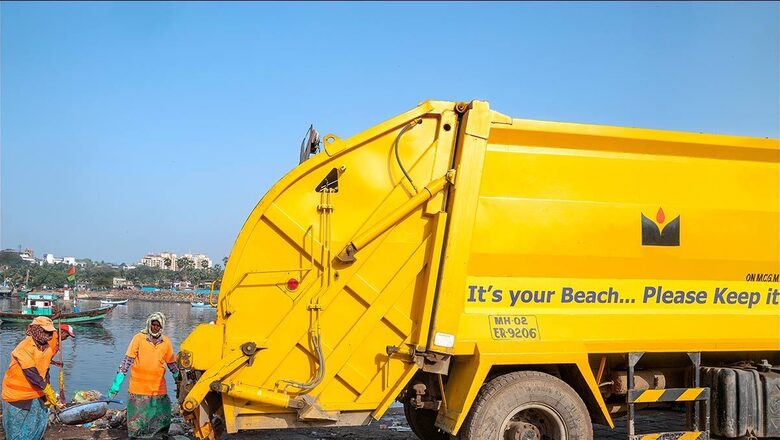
views
When we think of public health, we often think of doctors, nurses, or researchers who work to prevent and treat diseases. These are the celebrated heroes – the people who figure out the ins and outs of a disease outbreak, issue guidelines, and are there for us, if and when we fall ill. On the other end of that spectrum are the people whose daily work keeps our cities clean, and our communities healthy.
Sanitation workers, predominantly women in many parts of India, are the backbone of maintaining cleanliness and hygiene in our cities, towns, and villages. Their roles encompass a wide array of tasks, from cleaning public toilets to collecting waste and ensuring that our surroundings are free from hazards that can foster disease.
These women work diligently, often in challenging conditions, to protect the health of the communities they serve. Yet, their contributions are frequently overlooked and underappreciated.
Disease Prevention Through Cleanliness
Maintaining a clean city isn’t just about the aesthetics; it is a fundamental pillar of disease prevention. Women sanitation workers are at the forefront of this battle and it is important for us, as the recipients of their labours, to understand how their work directly impacts public health.
Containing the Spread of Contagious Diseases
Sanitation workers are responsible for cleaning public spaces and public toilets. When these spaces aren’t clean, all of us are prone to infections that may be lingering in every toilet. By meticulously sanitising these areas, these women help contain the spread of contagious diseases like gastroenteritis and cholera.
Waste Management
Proper waste management is crucial in preventing various health hazards. Toilet wastes in particular, can create several health hazards and pollute our lands and waters. Women sanitation workers collect and dispose of waste efficiently, reducing the risk of diseases transmitted through exposure to waste materials. Their work also contributes significantly to preventing vector-borne diseases such as dengue and malaria because the waste in which these vectors breed isn’t available.
Clean Water Sources
Sanitation workers also contribute indirectly to clean water sources. By ensuring that sewage systems are functioning correctly and by preventing the contamination of water bodies, they play a vital role in safeguarding access to safe drinking water—a cornerstone of public health.
Reducing Respiratory Illnesses
The removal of waste and cleaning of public spaces helps reduce air pollution and the risk of respiratory illnesses. By eliminating stagnant water and waste piles, sanitation workers mitigate the breeding grounds for disease-carrying vectors and allergens.
Challenges Faced by Women Sanitation Workers
While these women play a critical role in disease prevention, they face serious challenges themselves. Think about it: you come from a marginalised background and you aren’t educated, so you know your prospects are limited. You need this job, because you and your family are barely making ends meet. On top of that, you’re probably bringing home diseases because you’re working in challenging, unsanitary conditions. Your job pays you very little, but if you protest, you’ll be replaced. If you ask for gloves and other protective equipment, you’ll be replaced.
When even what little you have can be taken away, you have no power to change the situation.
Empowering Women Sanitation Workers Through Training and Education
The task is a complex one and needs a multipronged approach:
Education and training: So these women can, first, safeguard themselves from the many diseases they are exposed to at work. Second, training opens up job prospects that were previously unavailable to them.
Fair wages and benefits: When sanitation workers are trained, the nature of their work changes from ‘unskilled’ to ‘skilled’. They become employable by the organised sector, which not only compensates them fairly, but also provides employee benefits like a provident fund, etc.
Ensuring Safety: When these women are trained, they learn the importance of gloves, masks and protective clothing. They also feel empowered to walk away from jobs where they aren’t being provided these protections, because they know they have marketable skills now.
Awareness and Advocacy: When a woman sanitation worker makes the shift from the unorganised sector to the organised sector through training programs, it is a sea change in her life. She is now a skilled worker. She earns better wages and has job security. She probably wears a uniform, and commands respect she didn’t have before. To the other women in her circle, she becomes a shining example of what their own lives can be. Awareness and advocacy becomes a byproduct.
Supporting and Celebrating the Unsung Heroes
To this end, Harpic set up India’s first Harpic World Toilet College in 2016, with the stated objective of improving the quality of life of sanitation workers through their rehabilitation by linking them with dignified livelihood options. Workers trained by the college are provided placement with various organisations. Following the successful proof of concept in Rishikesh, HWTCs have opened in Maharashtra, Aurangabad, in partnership with Harpic, Jagran Pehel and Maharashtra Government.
Harpic, as India’s leading brand in the lavatory care segment, knows the challenges of effective communication around toilet access and toilet hygiene. For decades now, Harpic has used thought provoking campaigns to bring the basics of toilet hygiene to the masses. 3 years ago, Harpic joined hands with News18 to create Mission Swachhta aur Paani, a movement that champions the cause of inclusive sanitation, equality for all genders, abilities, castes and classes and the strong belief that clean toilets are a shared responsibility.
What we talk about matters, and Mission Swachhta aur Paani is leading the dialogue on how we can help solve the biggest problems surrounding toilet access and hygiene in India, today. By creating a platform that brings together government officials, NGOs, activists, sanitation workers, educators and members of the public, Mission Swachhta aur Paani is creating a space for both discussion and solution making.
It is also enabling people like us to be change makers at levels we are comfortable with. Mission Swachhta aur Paani is a great repository of information on all topics related to toilet access and toilet hygiene. If you feel strongly about any aspect, you’ll find the information you need to have the conversations you need to have.
Join us here, to learn how you can champion toilet hygiene and toilet access, and create a world where the women who keep our cities clean can hold their heads up high.



















Comments
0 comment